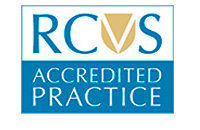Emergency contact: 01707 666399
Canine stem cell therapy - information for referring vets
Stem cell therapy has become quite well known by owners and vets. Working with the RVC’s Stem Cell Centre, this is a treatment that you could offer in-house to appropriate patients.
How do I know if I have a suitable case for canine stem cell therapy?
Autologous mesenchymal stromal cells (MSCs) (also referred to as mesenchymal stem cells) are now being used in small animal clinics to treat a range of conditions. They are most commonly used for the management of degenerative joint disease and osteoarthritis, including cases where more conventional therapies are not working or as an attempt to delay or avoid surgery. Published data suggests that stem cell therapy can have beneficial effects in dogs with osteoarthritis, and working from our experience with the horse, it could also be considered in selected tendon injuries.
Typically stem cell therapy is used in dogs with:
- Late stage osteoarthritis; commonly stifle or elbow where conservative/medical management is less effective or the side effects of treatment no longer tolerated. However, other joints may also be suitable. We do not currently consider this treatment an alternative to surgery for cruciate rupture or patellar luxation that cause lameness, however some dogs that subsequently develop secondary osteoarthritis may benefit from stem cell therapy later in life
- Selected tendon injuries such as supraspinatus tendinopathy (shoulder tendon problems), Achilles tendon
- Some cartilage joint diseases such as osteochondritis dissecans (OCD) and elbow dysplasia
My client wants to pay for canine stem cell therapy using their pet insurance – what is the process for this?
We recommend your client contacts their insurance company before seeking treatment, to check if stem cell therapy is covered by their policy.
What is the process for applying for RVC canine stem cell services?
Option 1: Referring your patient for assessment and stem cell treatment
Please make a routine referral with the Orthopaedic Service at the RVC Queen Mother Hospital for Small Animals, Potters Bar, Hertfordshire.
Option 2: The RVC Stem Cell Centre will work with your clinic directly
Please see our Stem Cell Centre pages for further information.
What quality levels does the RVC adopt for canine stem therapy?
There are currently no agreed industry standards for canine stem cell services. However, we apply the same rigorous Veterinary Medicines Directorate (VMD) standards used for our equine stem cell services. Our RVC stem cell lab is a VMD authorised Equine Stem Cell Centre (authorisation number ESCCA-007). It is one of only a small handful of centres in the UK which is authorised for the collection, storage, processing, production and administration of equine stem cells for use as an autologous treatment. This means that our laboratory is regularly inspected by the VMD to ensure rigorous quality assurance is applied to our services.The stem cell products that we prepare are known as enriched stem cells, as they are expanded in number in the laboratory. This is different to minimally manipulated stem cells, where cell preparations made from fat or bone marrow are injected into the recipient without undergoing further growth and expansion in the laboratory. This whole tissue cell population is a mixture of many different cell types of which stem cells form only a small percentage. There are currently a greater number of studies published supporting the use of enriched stem cells for the treatment of joint disease in dogs, although the two treatments have not been compared to date. To ensure that the stem cells that we prepare are of the highest quality, we also apply quality control measures that monitor the cells for sterility and stem-cell specific markers.

